How to navigate holidays and special occasions in recovery
June 11, 2025
Celebrating Recovery: Strategies for a Healthy Holiday Season

Introduction to Navigating the Holiday Season in Recovery
The holiday season presents a unique set of challenges and opportunities for individuals in recovery. Emotions can run high, social pressures intensify, and routines are disrupted. However, with thoughtful planning and proactive strategies, it is possible to enjoy meaningful celebrations while maintaining sobriety and supporting mental health. This article explores practical approaches, coping mechanisms, and supportive resources to help you navigate holidays and special occasions successfully in recovery.
Setting Realistic Expectations and Managing Self-Perception
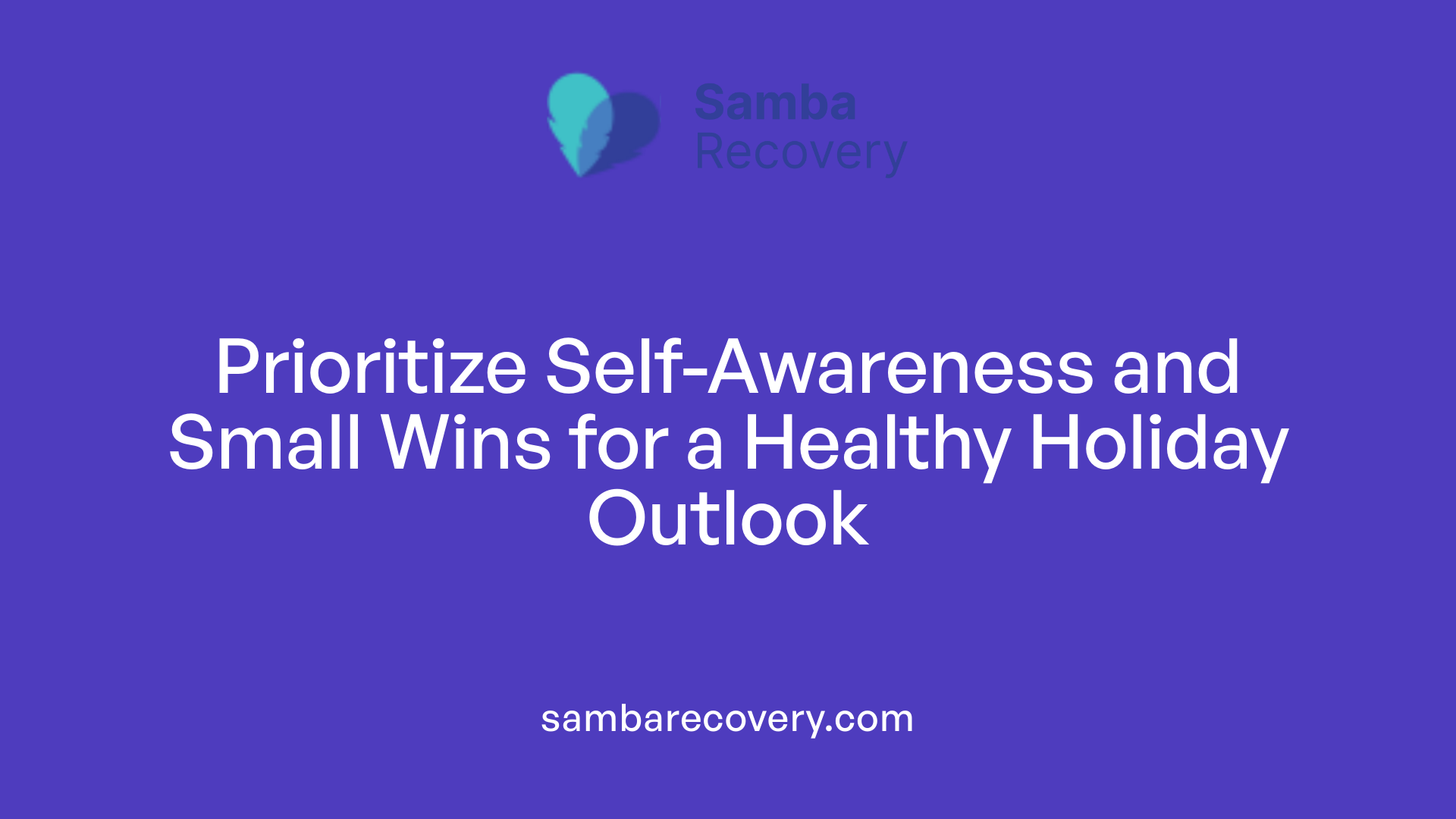
How can someone manage their mental health during the holidays?
Managing mental health during the holiday season involves a combination of self-awareness, healthy routines, and social support. First, prioritize meaningful face-to-face interactions with loved ones, as these connections can boost mood and create a sense of community. Engaging in regular physical activity, even simple walks, helps release stress and improve emotional well-being.
Practicing relaxation techniques such as deep breathing exercises, mindfulness meditation, or journaling can help manage feelings of anxiety or overwhelm. It’s also important to maintain familiar routines, including eating nutritious foods, getting enough sleep, and setting personal boundaries to prevent overcommitment.
Holidays can sometimes bring feelings of disappointment or stress, which makes it essential to reach out and talk to trusted friends, family, or mental health professionals if you're feeling overwhelmed. Finding purpose in holiday activities—like volunteering, celebrating personal traditions, or caring for others—can foster a sense of fulfillment.
Overall, managing expectations by being realistic about what you can handle, and focusing on small, positive experiences, helps maintain a balanced mental state. Remember, seeking support and practicing self-care are vital steps toward a healthy, joyful holiday experience.
Effective Holiday Sobriety Planning
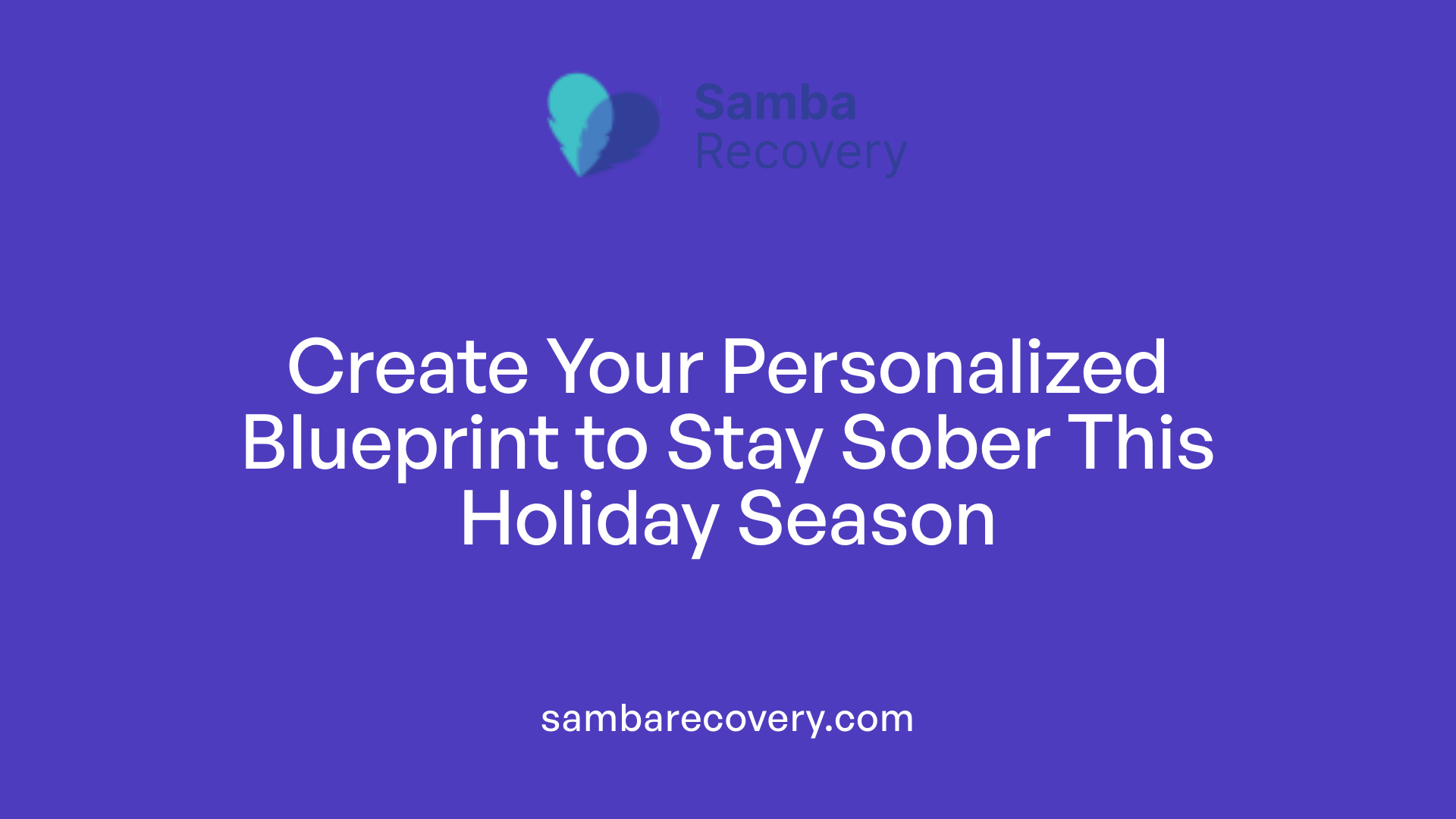
What is an effective holiday sobriety plan?
An effective holiday sobriety plan is a clear, personalized approach designed to help individuals in recovery maintain their substance-free lifestyle during the often challenging holiday season. It begins with setting a firm intention to stay sober, which can serve as a guiding principle amid temptations and stressful situations.
One of the crucial components is identifying personal triggers—specific situations or emotions that may lead to cravings. Common triggers during the holidays include social gatherings where alcohol or substances are present, family conflicts, financial stress, or feelings of loneliness and nostalgia. Recognizing these triggers allows a person to prepare beforehand.
Creating a relapse prevention strategy involves outlining practical steps to handle these triggers. This may include having exit strategies—such as excuse options or a planned departure from a gathering—reaching out to supportive friends, sponsors, or therapists when feeling overwhelmed, and practicing mindfulness or deep breathing exercises to manage stress and emotional discomfort.
Staying connected with a support network is vital. Attending extra support meetings, engaging with recovery groups, or scheduling regular check-ins with sponsors helps maintain accountability and emotional grounding.
Maintaining daily routines, like exercising, eating healthily, and practicing self-care, minimizes stress and promotes well-being.
Setting boundaries is also essential. It’s perfectly acceptable to decline invitations that pose a risk, such as parties where alcohol will be served, or to choose activities that align with sobriety, like volunteering or outdoor adventures.
Remember, flexibility is important. Occasionally opting out of certain events to protect sobriety is a sign of strength, not withdrawal.
In summary, an effective holiday sobriety plan combines clear intentions, trigger management, support involvement, routine maintenance, and boundary setting. This comprehensive approach enables individuals to enjoy the holidays meaningfully while staying committed to their recovery.
Managing Emotional Triggers and Family Dynamics
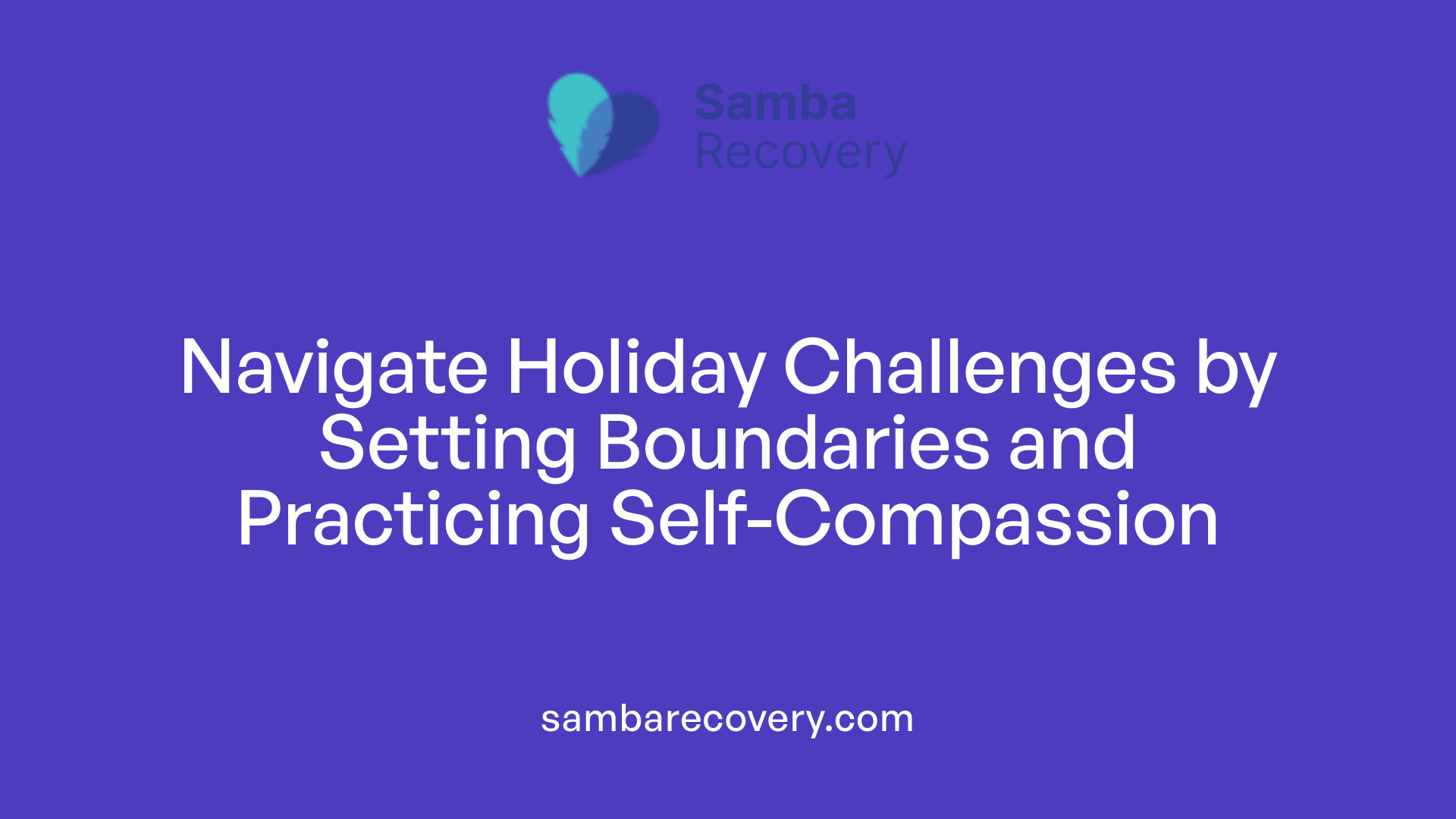
How can individuals cope with holiday trauma?
Holidays can sometimes evoke painful memories or emotional reactions, especially for those with a history of trauma. To navigate these feelings effectively, it's important to first recognize specific triggers—such as loud noises, certain conversations, or family conflicts—that may intensify emotional responses.
Developing personalized coping strategies is crucial. This can include practicing grounding techniques like deep breathing, mindfulness, or meditation to stay centered during stressful moments. Ensuring good self-care is also vital; aim for adequate sleep, regular meals, and engaging in joyful activities to reduce overall stress.
Setting clear boundaries with family members can limit re-traumatization and create a safer environment. Communicating needs openly and politely can help others understand your limits. If needed, consider limiting time spent in high-pressure situations and planning your exit strategies beforehand.
Seeking support from trusted friends, family, or mental health professionals provides additional reassurance and guidance. Preparing children for potential stressors, maintaining familiar routines, and focusing on kindness and gratitude can foster a sense of safety and connection.
Ultimately, recognizing your personal needs, practicing self-compassion, and utilizing available support systems are vital steps for coping effectively with holiday trauma. Remember, it’s okay to prioritize your mental health and take rest when necessary. Embracing these strategies can help transform holiday stress into opportunities for growth and healing.
Self-Care and Stress Management Strategies
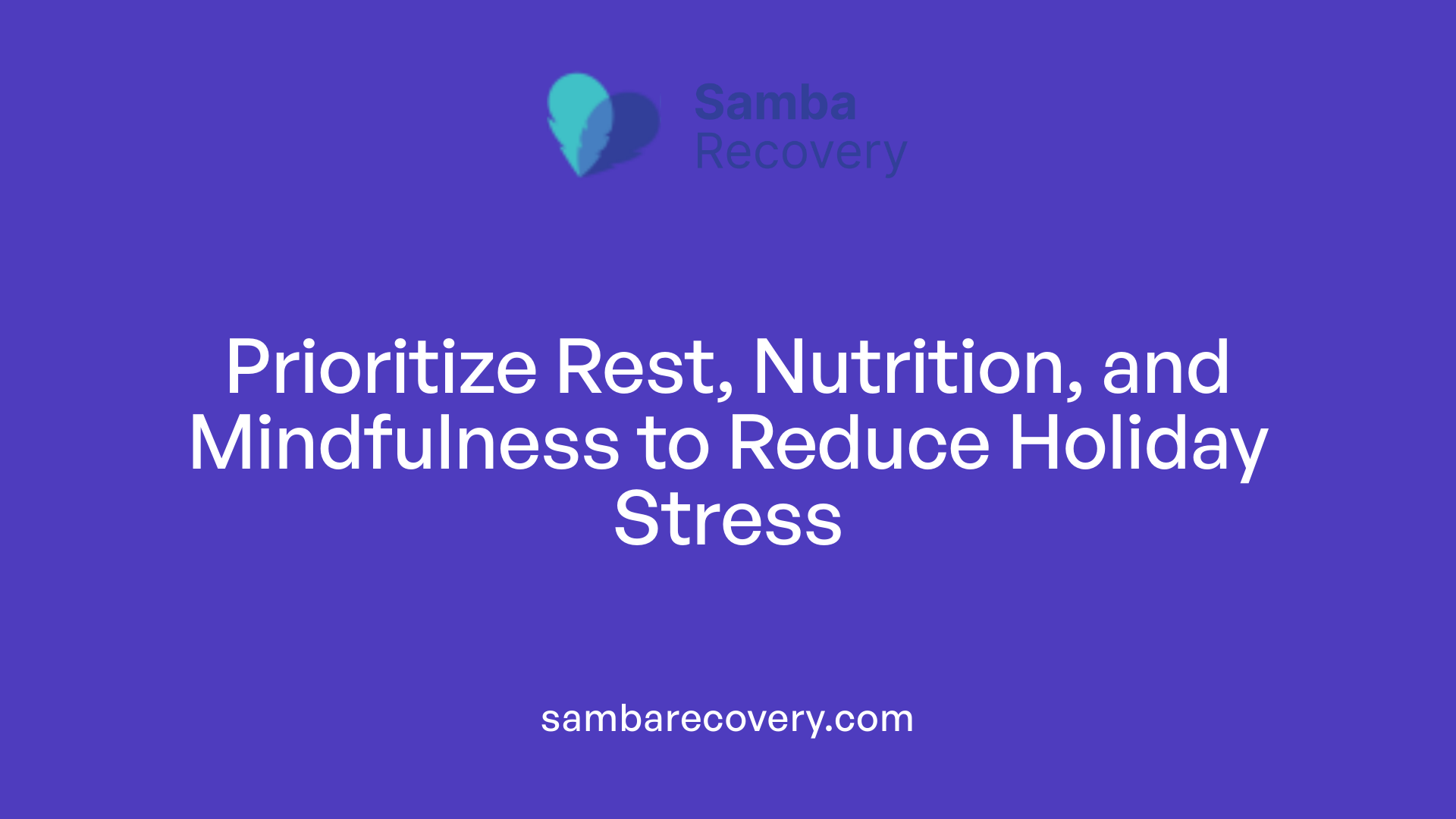
How can one navigate holiday stress effectively?
Managing holiday stress is essential for maintaining well-being and emotional balance. A practical approach involves prioritizing sleep and good nutrition. Ensuring regular, restful sleep helps the body recover from daily fatigue and strengthens mental resilience.
Eating balanced meals and staying hydrated support physical health and mood stability. Avoiding excessive alcohol, caffeine, and sugary foods can prevent emotional ups and downs.
Practicing mindfulness techniques such as deep breathing, meditation, or yoga can reduce anxiety and foster calmness. Engaging in relaxation exercises like progressive muscle relaxation or guided imagery allows individuals to release tension.
Participating in enjoyable activities—whether listening to music, watching movies, decorating, or outdoor walks—brings joy and helps divert focus from stressors. Making time for these small pleasures nurtures happiness and connection.
Setting realistic expectations, limiting overcommitment, and creating personal boundaries prevent feeling overwhelmed. Simplifying travel arrangements or gift shopping can ease physical and emotional burdens.
Honoring feelings and allowing oneself to process emotions like nostalgia or sadness with supportive loved ones or professionals is essential. Seeking help when emotional distress feels intense is a sign of strength.
Overall, integrating these self-care and stress management practices into holiday routines helps foster a positive experience, making the season more joyful and less anxious.
Building New Traditions and Celebrating Meaningfully
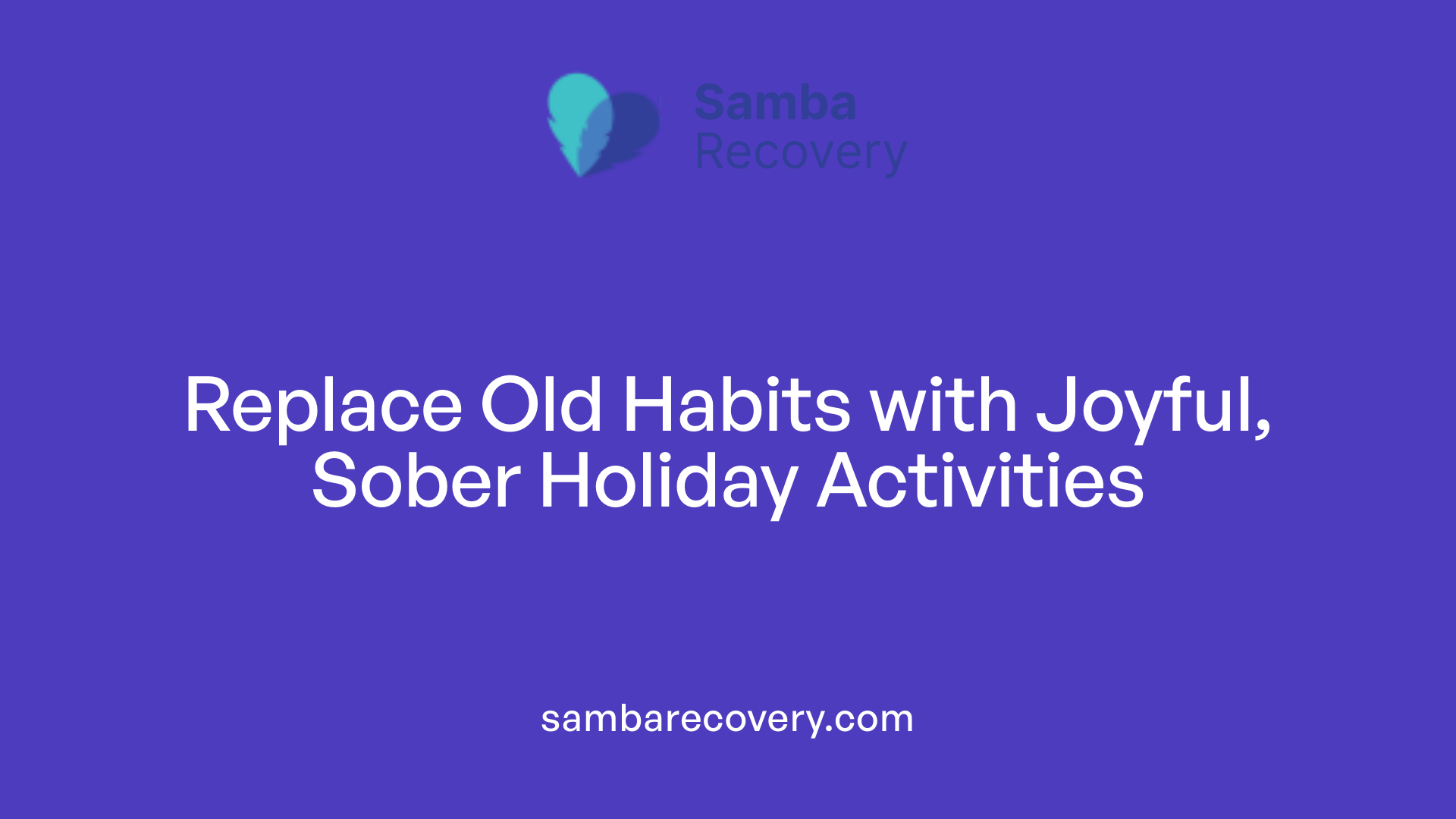
Replacing Old Traditions with Sober Activities
Many people find comfort and joy in reshaping their holiday rituals, especially when recovering from substance use. Instead of participating in traditions tied to alcohol or drug use, consider engaging in activities that promote health and happiness. For example, hosting a movie night, preparing festive meals, or creating craft projects can become new meaningful customs.
Engaging in Volunteering or Outdoor Activities
Volunteering during the holidays can bring a deep sense of purpose and connection. Whether helping at a local shelter or organizing a community event, giving back can fill the holiday with gratitude and joy. Similarly, outdoor activities like hiking, ice skating, or a simple walk in nature can refresh your mind and spirit, fostering positive feelings and new memories.
Creating Personalized Holiday Rituals
Every individual’s recovery journey is unique, so crafting custom traditions can make holidays more fulfilling. Personal rituals might include lighting candles in memory of loved ones, writing gratitude letters, or sharing stories from the past year. These personalized practices help focus on what truly matters, creating a holiday season that celebrates growth, resilience, and hope.
Supporting Loved Ones and Community Engagement
How can open communication before holidays help?
Talking with loved ones and friends before holiday gatherings is vital. It helps clarify the needs and boundaries for those in recovery. Sharing your plans and concerns allows everyone to understand expectations and avoid surprises. This openness creates a supportive environment and reduces anxiety.
What are ways to make gatherings alcohol-free?
Choosing alcohol-free activities or beverages shows respect for those in recovery. Offering non-alcoholic drinks like sparkling water, mocktails, or juice can make social settings more inclusive. Planning activities that don't focus on alcohol, such as game nights, outdoor outings, or movies, helps everyone enjoy the celebration.
How can you support the recovery goals of loved ones?
Supporting recovery involves active listening and encouraging healthy choices. Respect boundaries, avoid enabling behaviors, and celebrate small successes. Engaging in sober activities together and offering emotional support builds trust. Additionally, helping them develop plans for social events and reinforcing their commitment reinforces their progress.
Building a community that prioritizes understanding and shared responsibility is crucial. When families and friends work together, it creates a nurturing environment where recovery efforts are respected and celebrated. Creating these supportive spaces ensures holiday seasons are joyful, safe, and meaningful for everyone involved.
Post-Holiday Recovery and Reflection
How can I recover from the holidays?
Recovering from the holiday season involves focusing on self-care and adjusting routines to promote well-being. Prioritizing sleep is crucial, as adequate rest supports your body's healing process and reduces stress. Aim for 7 to 9 hours of sleep each night by establishing a calming bedtime routine, such as reading or practicing mindfulness.
Re-evaluate your nutrition and exercise habits—they often slip during busy holidays. Returning to balanced meals and regular physical activity can boost your energy levels and mental health. Remember, self-compassion matters; celebrate small progress and acknowledge the effort you're making.
Taking time for relaxation and engaging in enjoyable activities like listening to music, watching movies, or spending time in nature can promote emotional stability. Reconnect with support groups or therapists if needed, as ongoing support is vital for maintaining recovery.
What should I reflect on after the holidays?
Reflection allows you to assess your progress and set goals moving forward. Consider what strategies worked well during the holiday season—such as setting boundaries, practicing gratitude, or engaging in sober activities—and make plans to incorporate them regularly.
Think about any challenges faced, like social pressures or emotional triggers, and how you managed them. Recognizing these can help in preparing better responses for future situations.
Reflect on your own growth, the connections you've strengthened, and the positive changes you've embraced. Understanding that recovery is about ongoing progress, not perfection, can motivate you to stay committed.
How can I use holidays as opportunities for growth?
Holidays can be powerful opportunities for personal development. Use these occasions to build new traditions aligned with your recovery goals, such as volunteering or outdoor activities. Focus on shared, meaningful moments with loved ones that do not involve substances.
Practice gratitude and reflect on what you're grateful for, fostering a positive outlook. Embrace the chance to deepen your self-awareness and resilience by acknowledging your feelings and processing emotions with support.
Plan ahead for future gatherings by preparing responses to social pressures and having a sober plan in place. Celebrate your achievements, no matter how small, and reward your effort.
By viewing holidays as growth periods rather than just festivity times, you can cultivate a healthier mindset that supports ongoing recovery and enhances your sense of purpose.
Final Thoughts: Embracing Recovery During Festive Times
Navigating the holidays and special occasions in recovery requires planning, boundaries, and the support of a community. By setting realistic expectations, developing a comprehensive sober plan, managing triggers and emotional challenges, and prioritizing self-care, individuals can experience the season as a time of renewal, connection, and growth. Remember, recovery is a journey—not perfection—and celebrating small successes along the way fosters resilience and hope. Building new traditions and engaging in meaningful activities ensures that the holiday spirit remains vibrant and aligned with your long-term goals. With mindfulness and support, the holiday season can become an enriching chapter on your path to sustained wellness and recovery.
References
- How To Celebrate the Holidays In Recovery
- Navigating Holidays: A Guide For Individuals in Recovery
- How to Stay Sober: Navigating the Holidays While In ...
- How to Handle Holidays and Special Occasions in Recovery
- Navigating the Holidays: Common Triggers in Addiction ...
- Navigating the Holidays in Recovery: A Time for ...
- How To Navigate the Holidays in Addiction Recovery
- Navigating the Holidays in Recovery
- 10 tips to boost your mental health during the holiday season
- News & Features | BC Mental Health and ...
About Samba Recovery
Start your treatment today!

Featured Articles
Read the latest addiction news and recovery tips from our blog.
Samba Recovery never miss an opportunity
Substance use may be part of your story, but it doesn’t have to be the rest of it. Sustainable recovery is possible and the best version of yourself is waiting at our Atlanta and Savannah, Georgia addiction recovery centers.
We’ll help you learn that the opposite of addiction is connection. We’ll give you skills to discover your self-worth and show you the tools for a life of hope and promise.
Contact us today!
We accept most major insurances
We partner with most major insurances, enabling you to access premier therapy services.










































































































